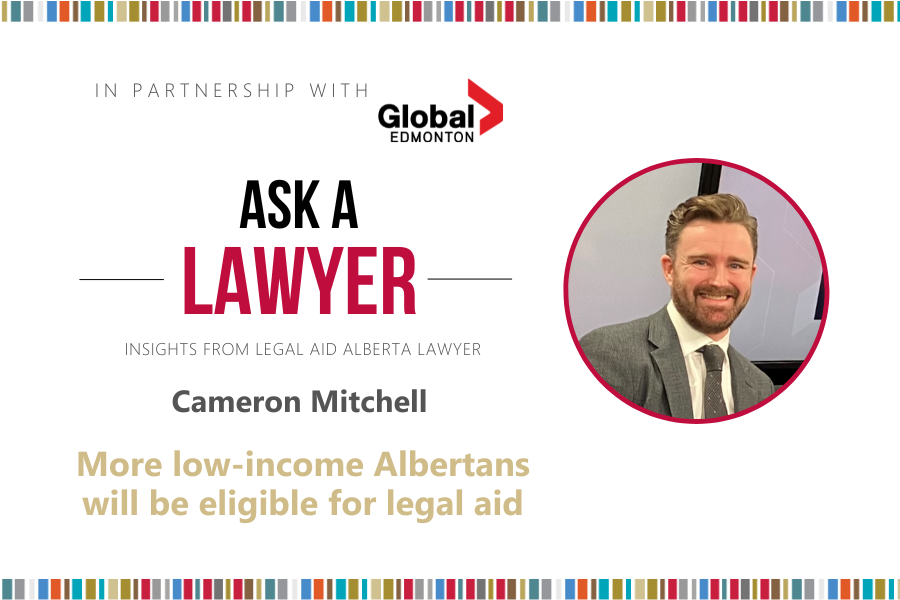Legal Aid Alberta’s Cameron Mitchell discusses upcoming changes to the financial eligibility guidelines beginning April 1 on this month’s segment of Ask a Lawyer
A single mother employed as a retail store greeter seeking freedom from a controlling relationship. A young adult working in a local diner, with no support is accused of a crime. An immigrant pursuing refugee status while juggling part-time house cleaning duties – who can they turn to for legal support?
Legal Aid Alberta is here to help.
Beginning April 1, more Albertans will become eligible for legal aid representation with new changes to the financial eligibility guidelines. Individuals applying for legal aid representation who earn up to $30,000 gross income may qualify for legal representation in eligible criminal, family and immigration cases.
Contrary to common misconceptions, our clients encompass a wide spectrum of individuals. While some clients face financial hardships and homelessness, others are gainfully employed, striving to make ends meet living paycheque to paycheque.
LAA staff lawyer Cameron Mitchell joined Global News Edmonton on this month’s segment of Ask a Lawyer to discuss the upcoming changes to the eligibility guidelines and how this will impact low-income Albertans across the province.
Please view the video using Microsoft Edge web browser.
Transcript of the program:
Vinesh Pratap: Legal Aid Alberta provides legal representation to it’s disadvantaged Albertans who couldn’t otherwise afford a lawyer, and effective April 1, even more Albertans could qualify for representation as the income eligibility limit increases to include those working for minimum wage, full-time. Here to explain what this means to low-income Albertans is Legal Aid Alberta staff lawyer Cameron Mitchell. Thank you so much for coming in and so let’s talk a bit about this at the starts April 1st to expand upon this who qualifies as of April 1st through legal representation and how did it all come to be?
Cameron Mitchell: So, it was decided as of April 1st you could make $30,000 a year so that’s equivalent to someone who is working full-time, on a minimum wage basis and they are going to qualify — and that’s just an individual — no dependents. So if someone you have a family, a lot of people you support, you can actually make a little more than that and still qualify for a lawyer through legal aid.
Pratap: So take us through how did it come to be that the qualifications expanded and what does it mean for people who need representation?
Mitchell: What we are really trying to address is all of the low-income population. So, some people think “low-income” and it’s easy to think of the unemployed or the homeless – well that’s just one segment of the low-income population. What we want to address with these expanded guidelines is the other segment that’s sort of like the working poor — so we try to identify those people who have legal issues. Like maybe it’s the kid down the street working full-time charged with criminal offence and they need legal help. Maybe it’s a cashier behind the counter — she’s facing possible deportation — she needs legal help. Maybe it’s a lady who has been working hard the past 10 years or so, has some savings but not enough for a lawyer, all of a sudden, she has a child custody battle — she needs legal help. So we want to make sure we help those people too.
Pratap: Talk to us about, you know, again the changes that come into effect April 1st. What has it been like for that segment of the population in terms of getting access to the justice system and trying to forward their particular cases, you know, the frustrations they have gone through?
Mitchell: The frustrations are limitless. The repercussions can be downright scary. I’ve seen cases before where people have represented themselves on family matters. They go in there, there’s a lawyer on the other side, they end up losing way more than just a shirt. I’ve seen people represent themselves on criminal trials, they go up against the full weight of the state, we’re talking crown, the police, they end up losing and they go to jail. So, we want to make sure those types of horror stories happen been less and less and more these types of people that the representation they need when they need it.
Pratap: It’s very interesting to hear especially people representing themselves in criminal cases. So self representation with the qualification, the guideline changes could this help the efficiency of the justice of the court system?
Mitchell: Yeah, I think so. I mean, especially early on because what we’re seeing right now is people they show up to court, they don’t know what’s going on, they’re trying to learn on the fly. they keep showing up again and again, leaning on the fly and nothing is really happening. So I think what this is going to help with is this will get more people lawyers, more people lawyers sooner, the lawyers are going to be able to get into a court, identify the legal issues, narrow the focus there’s going to be fewer appearances overall. I think less stress on the justice system.
Pratap: For people who do have questions, like any time you talk “legalese” it can be confusing, so can they simply reach out to Legal Aid Alberta and say this is my particular situation, can you help me? Can you not help me? Take us through that initial introductory process to legal aid.
Mitchell: 100 percent. A great starting point is always the website legalaid.ab.ca and you can go on there there’s a lot of resources to do some of the education yourself figure out some things yourself. And if you get to the point where you really need a lawyer, then you can do the application process, and with the expanded guidelines, there’s going to be more and more people that we’re going to start to approve for lawyers, more and more people that we’ll be able to help.
Pratap: OK, and that all starts again on April 1st. Cameron thank you so much for your time, the justice system can be an interesting one to navigate, so it’s greatly appreciated, you coming and helping us deal with the unknown that ones might face. Thank you so much.
Legal Aid Alberta lawyers specialize in family law, child welfare, domestic violence, immigration, and youth and adult criminal defence. If you have a question for a lawyer, send it to. [email protected].


